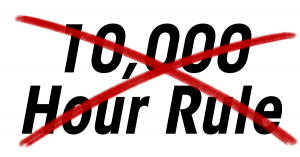Podcast: Play in new window | Download
 I am an architect by training. I graduated with an ms in architecture back in 1971… 50 years ago. I ‘practiced’ architecture for about 50 thousand hours… My classmates who didn’t quit in 1988… ditto. I won competitions, an award of excellence… My 10 thousand hours plus ‘worked as predicted’… their: not so much.
I am an architect by training. I graduated with an ms in architecture back in 1971… 50 years ago. I ‘practiced’ architecture for about 50 thousand hours… My classmates who didn’t quit in 1988… ditto. I won competitions, an award of excellence… My 10 thousand hours plus ‘worked as predicted’… their: not so much.
But all in all, I got excellent in a profession that was a poor match for my personality: I am a words person and a thinker.
I don’t even waste a glance at building nowadays: obviously my heart isn’t into it.
I did want something… wasn’t sure what though… So when in 1988 I was unemployed I was ‘forced to look’ what would light that fire.
As I said I was unemployed, except for a gig I had for two or three days every month. It almost paid enough to survive, but not quite. I could not legally work as an architect, and I spent a lot of my time bemoaning my fate.
Even famed Landmark Education seminar leader found it easier to say: just go back home… than to suggest that I snap out of it, and look at life differently.
I was reminded of this while, right after I published today’s article about winning and being a winner, I felt a reader go to his familiar place: utter resignation.
How did I recognize it as that? It was easy. It is very familiar to me…
In fact, when I look, most people have, deep down, a self-image of a loser. When I ask Source how many, planet wide, the answer is a staggering 91%.
Why? Because humans are meaning making machines, and we attach a meaning to everything. Including making a mistake, not being chosen, not being praised… and the meaning we attach is ‘loser’…
Why? Loser is the translation (by the mind) of the sentences that have ‘ever’ or ‘never’ or ‘always’ embedded.
I am never going to get this right! I am always going to be stupid… etc.
Can a lot of success, a lot of winning change that? No. Once ‘loser’ takes residence in your muscle memory, it is there to stay.
But you can do something, that albeit it is temporary, it will feel permanent if you are consistent in supporting it with actions.
What do I mean?
Words can be actions. Words are actually actions… even though most people use them as something cheap… inconsequential.
And yet… even ‘cheap’ words are actions… just not very powerful actions.
You can invent yourself as a winner, and allow life to show up to support it. ALLOW? Yes.
Life always responds to your word, but you are deaf and blind, and you only see what you expect to see: your personal reality, so you say what you have always said…
The past got into your eyes… ‘The past got in my eyes‘ is an old saying from the Peanuts comic strip: In it, the context is baseball and Lucy just dropped a fly ball she should have caught. Charlie Brown is the manager and the frames show Lucy apologizing to Charlie Brown with this explanation. ‘Sorry I dropped that easy fly ball, manager. I thought I had it. But as the ball was dropping from the sky into my glove I suddenly remembered all the other balls I missed that I should have caught. And then, well ‘the past got in my eyes’ and I dropped it.’ Your emotional recall of past scenarios that didn’t turn out well -> they only tarnish your ability to be fully present in the present. Don’t let ‘the past get in your eyes’ and blind you to all the possibilities around you!
‘The past got in my eyes‘ is an old saying from the Peanuts comic strip: In it, the context is baseball and Lucy just dropped a fly ball she should have caught. Charlie Brown is the manager and the frames show Lucy apologizing to Charlie Brown with this explanation. ‘Sorry I dropped that easy fly ball, manager. I thought I had it. But as the ball was dropping from the sky into my glove I suddenly remembered all the other balls I missed that I should have caught. And then, well ‘the past got in my eyes’ and I dropped it.’ Your emotional recall of past scenarios that didn’t turn out well -> they only tarnish your ability to be fully present in the present. Don’t let ‘the past get in your eyes’ and blind you to all the possibilities around you!
Here is an example of how I changed my mind
I think the first time I got the idea is somewhere around 1996. I was in a Communication Commando training. We were paired up. The topic was ‘gaining ground’ as in a war. Commando, war, got it?
Anyway, the assignment was to find a new way to gain ground in whatever area of life you choose. I chose business. I was a magazine publisher. The magazine was monthly and I had my hands full… But it occurred to me that if I could publish it biweekly, then I would increase the revenue almost 100%… but…
So I stated my idea, and immediately canceled it. After all, I said, it takes a whole month to come out with an issue.
But I had a ‘tickle in the back of my throat’ so to say. I got back from the training late afternoon. I wanted to make a cup of coffee, but there was no cream in the fridge. So I went to the corner store.
 It takes 10 minutes to get back, I said. The coffee will go cold…
It takes 10 minutes to get back, I said. The coffee will go cold…
On the way to the store I greeted everyone who was outside doing gardening or whatever. But on the way back I lowered my head, and looked at no one, talked to no one, I zipped right by everyone.
The way there took seven minutes. The way home took 70 seconds.
Aha, I said. The past got into my eyes… I KNEW it took a month to create a magazine, but it ain’t necessarily so. It can be done in half the time. And then I did exactly what was necessary to do, and came out with the magazine twice from then on, and almost doubled the income.
 Now, how is this useful to you?
Now, how is this useful to you?
Every time you KNOW something, anything, just whisper under your breath ‘it ain’t necessarily so’ and look again.
- You may find out that you are not a loser.
- That you are not stupid.
- That your husband is not jealous.
- That your work is not as hard as you remembered.
- That you can go without breakfast and be OK.
- That not getting a full eight hours of sleep doesn’t necessarily mean you are screwed for the day.
- That you don’t need to be liked to be OK.
- That you can look silly, fat, unkempt, and still be OK.
Yeah… list all the issues that come up to you as you read this list… and remind yourself: it ain’t necessarily so… EVER.
Oh, and to answer your eager and hopeful question: No…
…it never goes away. It comes up less frequently, but it will come up. So stay in shape, stay in practice. You’ll need it.
What? You don’t want to do anything that needs to be done over and over? Hey, be my guest. Just don’t complain… deal?
The 10,000 hours rule is not a hard and fast rule.
If you don’t change your mind, you can practice something for 20-30-40 thousand hours and you won’t get to excellence.
Excellence is an inside job. A self-image. A mindset. A context. A HABITUAL context at that.
I trained to be an architect for five years, 129 hours a week. Take away summer vacations, holidays, and you get about 20 thousand hours.
I looked at the work of some of my classmates the other day. They got the same diploma, but they never got to excellence, not even after 50 years in the profession…
 The mindset there is ‘getting through’ or ‘making it’, It is. It was. It has been.
The mindset there is ‘getting through’ or ‘making it’, It is. It was. It has been.
So unless you change the mindset, nothing will ever change.
So in the HERO program the most important element of the work is to do what there is to do, even decide what you are going to do, is from a mindset.
A mindset that comes from a life lived joyously, freedom, and making a difference. Not having to, needing to, wanting to, or should.
In yesterday’s Office Hours I have a taste of how to do it… because, between you and me, it is NOT EASY. Slaving away for ten thousand hours is easy compared… Not rewarding, but easy.
The Office Hours’ recording is in my mobile app… and you can get it, and learn… In the HERO program I’ll work with everyone to keep the context empowering, exciting, inspiring… or we’ll miss the easy fly ball, like Lucy in the Peanuts comic strip.
OK, here you go. Go get the recording

